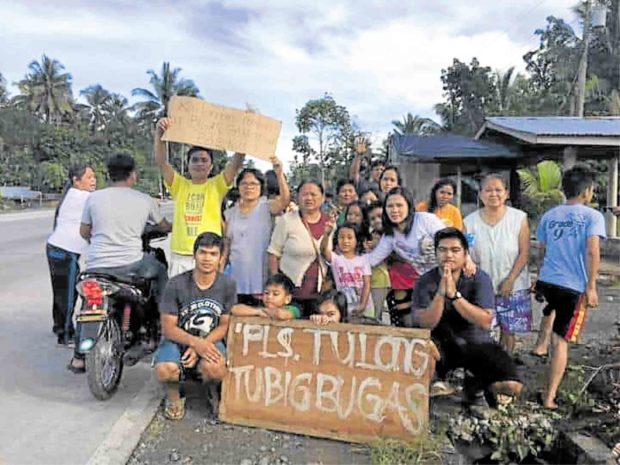The Inquirer, among other organizations/agencies in the Philippines, is acting as conduit for the help intended for the earthquake survivors. Cash donations may be sent to the Inquirer Foundation Corp. through its Banco de Oro (BDO) current account No. 007960018860 (Philippines). Donors may also inquire with the Inquirer’s corporate affairs office through email at foundation@inquirer.com.ph.
Mindanao quake survivors grow desperate for aid

Earthquake survivors need water ("tubig"), rice ("bugas"), foodstuffs, clothes, sleeping supplies, among other needs. Photo by W. MAGBANUA
MAKILALA, Cotabato, Philippines — Scores of villagers displaced by three recent earthquakes that struck Mindanao were growing desperate for help and have taken their appeal for aid to roadsides as the government and private groups struggled to distribute relief goods to stricken areas, some cut off by landslides.
At Barangay Malasila in Makilala, Cotabato province, groups of residents held up signs in English and the local language pleading for supplies, specifically rice, water and medicine, to people passing through their communities. Some received money from travelers on the highway that links Cotabato to Davao City. Several Malasila menfolk said they returned to their homes to gather root crops, like sweet potatoes or bananas, that they could take back to their families to eat in their roadside tents.
They said the quakes had cut off water supply from traditional sources like deep wells and springs.
Many of the villagers, including members of the Manobo tribe, already were living hand-to-mouth as rubber tappers before the disaster struck and were now out of work and have no money to buy food at the market in the town center several kilometers away.
‘Endless appreciation’
Some netizens posted photos and comments on social media to support the villagers’ appeal for help.
“No more food available in our place, we no longer have rice, our water sources had dried up after the earthquake,” Shiena Mae Villeza said in a Facebook post.
“For all who responded to our appeals, our endless appreciation for your help,” Villeza said, adding: “Your generosity will be reciprocated by God.”
Aside from food and water, residents displaced by the earthquake in
Makilala, Cotabato province, are asking for tarpaulin sheets, or
“trapal,” a material suddenly in demand for evacuees who need to put up
tents.
The NDRRMC said more than 146,700 people from nearly 150 villages in central Mindanao and nearby Davao region were affected. Up to 20,635 were housed in temporary government shelters and 6,850 others were staying with relatives in safe areas, it said.
Off-limits
Many structures, including homes and buildings damaged by a 6.3-magnitude temblor on Oct. 16, were declared off-limits following the Oct. 29 quake and the 6.5-magnitude quake that struck two days later.
All the three major quakes and scores of aftershocks were centered near Tulunan, Cotabato, and caused by the movement of the Cotabato Fault System, according to the Philippine Institute of Volcanology and Seismology (Phivolcs).
The Department of Social Welfare and Development was coordinating with the military to fly relief supplies, including rice, food packs, sleeping kits and tents made of tarpaulin, the NDRRMC said.
Red Cross volunteers, including actress Angel Locsin, were seen distributing food, water and other relief supplies in Malasila and the village of Batasan, also in Makilala.
The local aid delivery system has been hampered because many of the barangay officials in the quake-hit towns were also quake victims themselves.
In Digos City, the local government said the homes of at least 130,000 people, about 65 percent of the population, had been destroyed or damaged by the quakes.
Most residents, fearing aftershocks, have refused to sleep in their homes at night. Those who lost their homes prefer to pitch tents in open fields and others set up temporary shelters close to their damaged houses. Some sleep in hammocks under the trees.
Due to the sharp rise in demand, the price of tarpaulin has doubled.
Digos Mayor Josef Cagas said he was seeking ways to make tarpaulin one of the essential items subjected to price freeze during calamities.
Quick response funds
Acting Budget Secretary Wendel Avisado said funds were already available for release to the quake-hit areas. In case they were not enough, local governments should request for more money from the national government, he said.
“Departments have quick response funds, and that’s what they are currently doing—they are downloading funds to their regional, provincial and city offices to fast-track the government’s response,” Avisado told reporters in a text message on Saturday.
Damage assessment
The Department of Finance had already asked all treasurers and assessors of earthquake-affected local governments “to submit their estimates of the damages so we can determine the amount required,” Finance Secretary Carlos Dominguez III said in a Viber message to reporters also on Saturday.
.—With reports Ben O. de Vera, Jhesset O. Enano and Melvin Gascon

